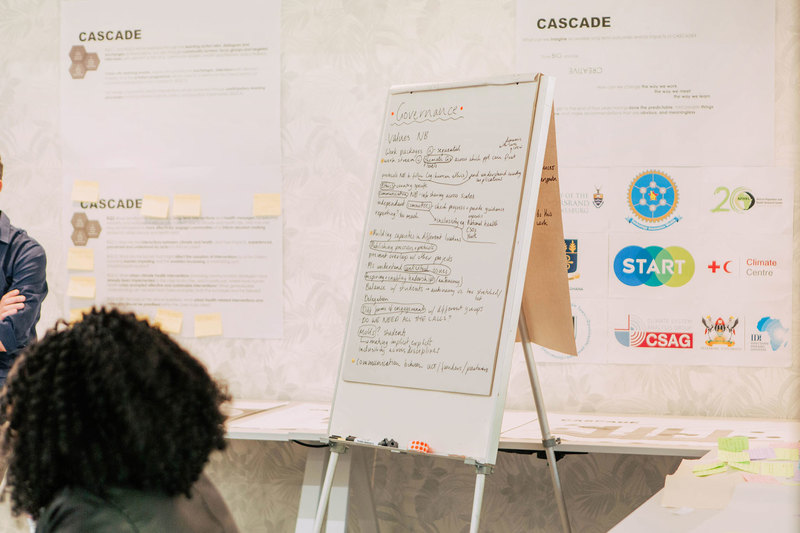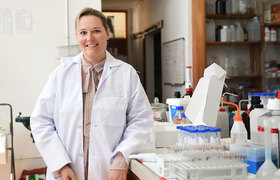A new era of urban climate health resilience in Africa
30 November 2023 | Story Alacia Armstrong. Photos Robyn Walker. Read time 4 min.
The Cascading Climate and Health Risks in African Cities (CASCADE) consortium was officially launched recently with a focused mission: to advance the understanding of critical urban health challenges faced by African cities and point towards practical and effective interventions.
Led by Dr Chris Jack and Professor Bruce Hewitson from the Climate System and Analysis Group (CSAG) at the University of Cape Town (UCT), CASCADE aims to build on the success of their previous programmes, like the Future Resilience for African CiTies And Lands (FRACTAL). Their long-standing alliance with the City of Cape Town will further boost the success of this programme for the region.
Dr Jack, the deputy director at CSAG, said “The CASCADE consortium is a testament to our commitment to deepening our understanding of climate and health in Africa and providing the evidence required to urgently implement effective interventions. We aim to foster vital connections across local government officials and public health agencies to civil society organisations and community groups. It’s about building a truly effective and sustainable partnership, one that thrives on mutual learning and collaborative action across the continent. By investing in a dynamic cohort of students and early-career researchers, CASCADE will contribute to a new generation of engaged climate and health scholars and practitioners across Africa.”
“CASCADE is an excellent example of how we can address the challenges of climate change, poverty and inequality.”
In 2050, nearly 60% of Africa’s population will have embraced urban life. Rapidly growing cities have already emerged as a nexus of complex and compounding climate-related risk. Both local and remote climate change has already compounded with significant infrastructure, service, systemic challenges such as water supply, sanitation, and food insecurity. The diversity of challenges requires an innovative, collaborative approach focused on real outputs and impact. CASCADE aspires to bridge this gap, ensuring that African cities are adequately equipped to face, navigate, and overcome these challenges.
Pan-African vision
The consortium is a multi-partner, multi-million-dollar four-year consortium with a pan-African vision with partners across southern, eastern, and western Africa, amplifying regional research capabilities, contextualising issues, and nurturing scientific leaders. Project partners include the University of Ghana, Chinhoyi University of Technology, Makerere University, the Global Change Institute (University of the Witwatersrand), The African Population and Health Research Center, Red Cross Red Crescent Climate Centre and START International.
Emeritus Professor Daya Reddy, the vice-chancellor interim of UCT, said: “UCT’s focus in higher education is to create not just knowledge but also to build informed and engaged leadership. CASCADE is an excellent example of how we can address the challenges of climate change, poverty and inequality, and the stresses on urban infrastructure, through the teamwork of researchers, practitioners, community leaders and policy makers.”
The consortium is funded through the second phase of the Developing Excellence in Leadership, Training and Science (DELTAS II) Africa programme and implemented by the Science for Africa Foundation, with support from Wellcome and the United Kingdom Foreign Commonwealth and Development Office. DELTAS II supports African-led research and scientific leadership to address health and development challenges on the continent. Capacity building is therefore a core component of the programme, and as such, emphasises the empowerment of young researchers, ensuring they get hands-on, cross-continent experiences that place them directly in the heart of the issues they aim to solve.
Key feature
A key feature of CASCADE will be its city learning-action labs and thematic/sectoral dialogues, managed by the regional hubs. Moving away from conventional workshops, these labs provide a space for building relationships and trust, collaboration and co-creation, utilising a truly bottom-up approach supported by cross-learning and critical reflection. The labs are constructed to foster mutual learning, resulting in new and innovative knowledge about complex problems, critical intangibles such as trust and mutual respect, as well as tangible outputs such as policy recommendations, action plans, and new knowledge and practice networks.
 This work is licensed under a Creative Commons Attribution-NoDerivatives 4.0 International License.
This work is licensed under a Creative Commons Attribution-NoDerivatives 4.0 International License.
Please view the republishing articles page for more information.























